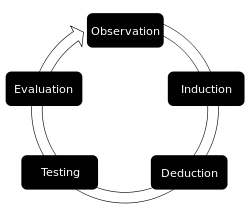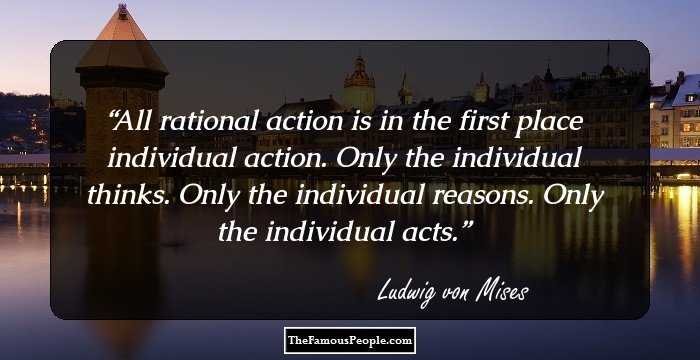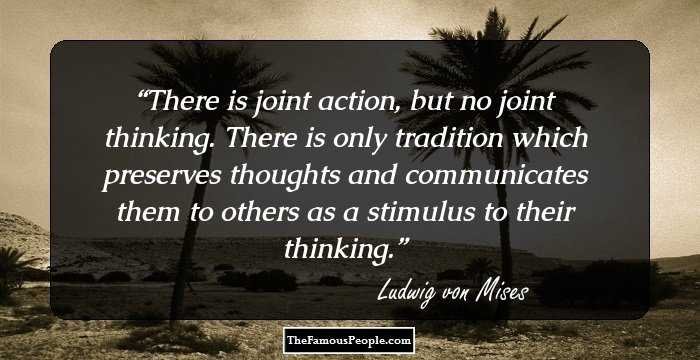The single greatest fallacy in the realm of economics is treating it as an empirical science. If you can think of any other great fallacy, then it's either closely linked/rooted in treating economics as an empirical science. I'm making a very strong statement here. Before I explain further let me top my own statement by saying this: Economics is metaphysical and anybody who say economics is an empirical science is a plain retard.
Do I have your attention or did I just went too strong? Let's start with basics. What's an empirical science? You could simply call it something based on experience. The word empirical literally comes from the Greek word for experience. If I use a more formal looking explanation I could say Empirical evidence is the knowledge received by means of the senses, particularly by observation and experimentation. Here is an example on how empirical sciences work.

If the best argument against democracy is a 5 minute conversation with the average voter, the best argument against economics being an empirical science is a single week of day trading cryptocurrency.
Here: https://www.binance.com/?ref=10102736 you can try Binance, the fastest growing and the single best centralized exchange on the planet with $7,631,739,108 trading volume at the time of writing. If you have a deep down something against centralization go ahead with Bitshares. (Declaimer: Since I own a bunch of BTS I totally have the incentive to lead you to the only DEX that can run NASDAQ on top of it.)
Some things you just have to know. I'm going to write the rest of the article assuming you have tried day trading as it is the best real time representation of what a market (and therefor economic activity) really is. For anyone who wants to learn economics, my knee-jerk recommendation is The magnum opus of Ludwig von Mises Human Action: A Treatise on Economics
“Praxeology is a theoretical and systematic, not a historical, science. Its scope is human action as such, irrespective of all environmental, accidental, and individual circumstances of the concrete acts. Its cognition is purely formal and general without reference to the material content and the particular features of the actual case. It aims at knowledge valid for all instances in which the conditions exactly correspond to those implied in its assumptions and inferences. Its statements and propositions are not derived from experience. They are, like those of logic and mathematics, a priori. They are not subject to verification or falsification on the ground of experience and facts.” ― Ludwig von Mises, Human Action: A Treatise on Economics

This is an axiom. You can make algorithms or even use machine learning and AI. But that's also a result of Human Action just as dumping toxic waste into the environment resulting in genetic mutations years later. Human thinking or Human action doesn't mean that what is intended is carried out. You may buy a coin expecting MASSIVE profits and see it all crash and burn and finally after you sell it, it reach a new ATH. Throughout the whole scenario You were thinking. You were making decisions. You were acting upon those decisions.
And there you have the root of economic activity. You think. You act. Stuff happen to you. You happen to stuff.

Now let me tell you a quick joke: There was this little not so bright girl who always sleep during Sunday school. One day the teacher called on her while she was napping, "Tell me, who created the universe?" She didn't hear the teacher. So a friend called Johnny came to the rescue with a pin and jabbed her in the rear. "GOD ALMIGHTY!" shouted the girl -let's call her Chloe- and the teacher said, "Very good" and Chloe fell back asleep.
A while later the teacher asked, "Who is our Lord and Saviour?" Again the girl is asleep>> Little Johnny to the rescue.'JESUS CHRIST!" shouted Chloe and the teacher said, "very good," and Chloe fell back to sleep. Then came the third question: "What did Eve say to Adam after she had her twenty-third child?" Johnny jabbed her with the pin. This time Chloe jumped up and shouted, "IF YOU STICK THAT F*****G THING IN ME ONE MORE TIME, I'LL BREAK IT IN HALF AND STICK IT UP YOUR ARSE!"
Now I'm going to have to ask you to read that whole thing again. No, seriously read it again...... and again. This is important. Repeat ~5 times.
Now what can you tell me about the reaction you got each time. Comedy involves human interaction and when a higher intellect(compared to animals with simpler brain) at play you can't produce results in a lab. You cannot lab test human condition. You cannot do an empirical study on comedy. In fact comedy is utterly subjective. For an example some people think Louis C.K. is actually funny.There are some people who loose their minds over some jokes and get hyper offended.
My personal favorite comedy of all time is PK. It's a masterpiece in my eyes. It's easily the funniest movie I've seen and it's also a very serious and profound movie that explore human society and beliefs. It's also incredible smart. Take a look at some of the average scences.
My second favorite comedy happens to be Airplane! which is an entirely different kind of movie. If you try to dissect and study what makes PK funny and try to compare it with Airplane! you'd barely find anything common. Even though I find them both to be funny some may disagree. Over time a person's likes and dislikes can also change and evolve. No 2 human beings are similar. Above all no human being is a static existence. That's why you don't laugh at the same joke with the same intensity at every single time. You become transformed by your experiences.
“economics is a living thing—and to live implies both imperfection and change.” ― Ludwig von Mises, Human Action: A Treatise On Economics
Different people act on different occasions with different goals in mind. Keynesian economics that has become a cancer to the world and is also the primary root cause behind financial crisis, massive inflation and upside down madness of negative interest rates (which is why you should empty your savings account into cryptos). Then there are fully planned economics of communists or self-contradicting garbage of non capitalist anarchists (AKA anarcho-communists AKA oxymoron)
Without calling out on these stupidity with some more strong claims, allow me to tell you about Isaac Newton. Most of the physics education in school is based on his theories. When you apply them in general everyday life it would appear that Newton was correct. But the very existence of satellite communication, GPS or even the fact that we are talking about quantum resistant cryptography is a proof that Newton was utterly mistaken and his theories including the ones like Gravity were mere approximations. Simply put if Issac Newton was correct, we wouldn't have much of our modern conveniences. Period.
For bit of extra entertainment try: https://en.wikipedia.org/wiki/Religious_views_of_Isaac_Newton
In the same vain, without the free market we would still be in the middle ages or at best at the levels of Greek-Roman empires. You wouldn't be able to flip a switch and illuminate a room at night. You won't be able to communicate with a person few miles away without actually walking there (because a horse was a luxury item). You wouldn't be able to at least try enjoy an ice-cream.

We are where we are as a civilization as a result of entrepreneurship and creativity. By definition creativity is something beyond the realm of existing models. Creativity is an act of transgression. Comedy is an act of going against the norm. You wouldn't laugh at something ordinary and you won't build a business without a purple cow.
“ZERO TO ONE EVERY MOMENT IN BUSINESS happens only once. The next Bill Gates will not build an operating system. The next Larry Page or Sergey Brin won’t make a search engine. And the next Mark Zuckerberg won’t create a social network. If you are copying these guys, you aren’t learning from them.” ― Peter Thiel, Zero to One: Notes on Startups, or How to Build the Future
Economy is driven through innovation. That's why blockchain is the hottest sector. Else we'd still be talking whether Coca-Cola is a good buy. Even though Uber is a charity in disguise bleeding money all over the place, it changed the way we live and interact on this planet. Who could have predicted that. If somebody could, taxi companies would have adapted. But human mind is not something you can put in a lab or a computer model and figure out how it works. Even if some success to be found, that would be just one in 7.6 billion minds.
Now here is the most important part. Do you know 2 people who are wired completely different from each other? If you don't then allow me to help. Stephen Hawking and Kim Kardashian. Now tell me how you are going to study these 2 individuals empirically. Would you even find any common ground except for basic needs like Air, Water, Food? How can a market of 7.6 billion people be studied empirically?
Then what is economics???
I'll quote from a piece of writing from Antony P. Mueller which I was happy to discover so I can slap it on other people's faces when they discount what I have to say because I thought my time was better spent on self learning instead of finishing high-school.

All genuine laws of economics are logical laws. Economic laws are synthetic a priori reasoning. One cannot falsify such laws empirically because they are true in themselves. As such, the fundamental economic laws do not require empirical verification. Reference to empirical facts serve merely as illustrative examples, they are not statements of principles. One can ignore and violate the fundamental laws of economics but one cannot change them. Those societies fare best where people and government recognize and respect these fundamental economic laws and use them to their advantage.
Let's simplify
- analytic proposition: a proposition whose predicate concept is contained in its subject concept
- synthetic proposition: a proposition whose predicate concept is not contained in its subject concept but related
A simple example for an analytic proposition would be Triangle. The term itself include the fact that it has 3 angles. The definitions of a triangle includes 3 sides just as a "husband" is both a married person and a male.
As for a synthetic proposition we could say that the sum of internal angles of a triangle is 180 degrees and the sum of external angles is 360 degrees. These truths are not included in the definition of the "Triangle". When I say economic activity is Human Action based on Human thinking, it's not included in the definition of what economics is. But through clear meticulous observation we can understand that there will be no economic activity without the human mind. (Algorithms and smart contracts are human made just like an engine of a car)
- a priori proposition: a proposition whose justification does not rely upon experience. Moreover, the proposition can be validated by experience, but is not grounded in experience. Therefore, it is logically necessary.
- a posteriori proposition: a proposition whose justification does rely upon experience. The proposition is validated by, and grounded in, experience. Therefore, it is logically contingent.
A posteriori proposition should be clear. It's empirical. It's built on top of experience. There is nothing metaphysical to it. If I say Satoshi Nakamoto created Bitcoin in 2009 you need to verify that with experience. The knowledge cannot exist on its own.
On the other hand A is A and 2+2=4 period. No need to explain or experience. If I go for a more complex example, Bitcoin has been around for more than 8 years. It was available for use during the year. Nobody needs experience to to verify the claim because if Bitcoin has been around for more than 8 years, it was certainly available during the previous year. If a person is 25 years old, then that person is an adult. You don't need additional experience to verify that a 25 year old is an adult.
Economic laws are synthetic a priori much like a game of Go than a game of Chess. You cannot calculate outcomes with just brute force. Even a game of Go doesn't have 7.6 billion individual entities acting alone in ways that cannot be tested in a lab. At least the stones in Go stay static and doesn't move on their own with their own agendas.
Economics cannot be planned and it's laws cannot be argued against. It's also something that cannot be modeled or lab tested just as comedy cannot be lab tested or predicted with graphs. It's just what it is.
The theory of gravity was a lie. It got empirically proven to be false with the dawn of space age. But what make Apples fall down was always there. The bogus theory got it wrong. The models were only useful to a certain degree. All things works fine until it doesn't. The financial crisis and what followed were a result of using bogus theories. They were results of not understanding economics. They were the results of trying to grow comedy in a lab.




